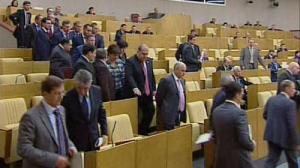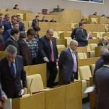
Kremlin Masterminds Mass Election Fraud
Publication: Eurasia Daily Monitor Volume: 6 Issue: 196
By:

On October 11, the United Russia party, led by Prime Minister Vladimir Putin, won more than 7,000 local elections in 75 of its 83 regions. President Dmitry Medvedev hailed United Russia’s victory as showing that the party had a “legal and moral right” to run the regions (www.kremlin.ru, October 12).
Others were outspoken in their criticism. “Obvious falsification of the election returns showed …that to all practical purposes the institutions of democratic elections in Russia are wiped out today,” stated the liberal Yabloko party (www.yabloko.ru, October 19). Overwhelming evidence indicates that United Russia won the elections by blatant and open fraud (Kommersant, October 15). Three parliamentary parties other than United Russia –the Communist Party, the Kremlin’s old stooge Vladimir Zhirinovsky’s Liberal Democratic Party and Putin’s loyalist-cum-opposition to the Kremlin Just Russia– staged a demonstrative walkout from a Duma session to record their protest.
The former Soviet Leader Mikhail Gorbachev observed: “If people, who are so well-disciplined, cautious and close to the government, risked taking such a step, that means that confidence in elections as a political institution has been lost completely” (Novaya Gazeta, October 19). Calling the elections, “the mockery of the people,” Gorbachev concluded: “The people are not coming to vote. What kind of democracy is that, if the people are not taking part in it?”
Though the “rebellious” parties quickly chose to return to the Duma to bargain for their private pound of flesh, the issue of “what kind of democracy” exists, or rather where this type of “democracy” might lead the country, remains high on the Russian political agenda, pushing observers to make dire conclusions.
Indeed, the popular Moscow-based Moskovsky Komsomolets daily speculated on October 19: “If a voter cannot express his will via elections, or if he concludes that he has done so and the regime has ignored his vote,” then that voter “will take to the streets,” as events in Tbilisi and Kyiv have shown. But if the authorities want an Orange Revolution in this country, then all they have to do is to continue to act in the same spirit that they are doing now” (Moskovsky Komsomolets, October 19).
While highly critical of the United Russia party, Gorbachev carefully chose to avoid fingering its leader Putin as the main culprit who has presided over dismantling whatever had once passed for democracy in Russia. While decrying the fraud and deception that might eventually push the people to take to the streets staging an “Orange Revolution,” Moskovsky Komsomolets concluded that “the main political resource of Putin always consisted not of ‘the FSB guns’ but respect and support from a large part of society.” Therefore, the paper maintains, his supporters who believe that they have to falsify elections to continue to boost him may now be doing more than any of his opponents to achieve exactly the opposite.
This sounds so very familiar! “The good Czar surrounded by bad boyars” has been the standard explanation of Russian ills for centuries. In the last century, actually, this plea transformed into: “Stalin does not know!” Amazingly, this explanation often came from the same people who saw Stalin as God, Vozhd and Genius. But how would God and Genius not know? Consequently, it is unclear as to how Putin would not know what his handpicked supporters are up to. And why Putin, who controls the process and would have his party win, according to all the pre-election polls, felt it necessary to rely on fraud?
It appears that this is not simply because Putin is a confirmed control-freak, but he does not indeed respect those institutions that he had rolled back over the decade of his rule: free elections; free press; and society’s self-organizations. Putin does not respect such institutions for quite practical reasons: unpredictable election returns; media reports and public control will effectively curb the unbridled control of the Putin-led establishment over Russia’s assets, primarily over her hydrocarbon riches.
Invoking the specter of a possible Russian Orange Revolution seems quite far-fetched. The Russians will hardly self-organize on such a sophisticated level in the foreseeable future. The prospects are bleak: more plausible is the Russian “bunt” (rebellion), senseless and merciless,” to quote Pushkin, or rather a series of such disjointed bunts. However, even more feasible is the option of Russia repeating the fate of the Soviet Union –and simply falling apart. That could be the most likely result of election fraud and other political tools used by Putin. In the September 10 article “Forward, Russia!” broadly advertized as his liberal manifesto, President Medvedev called for sweeping reform and drawing correct conclusions from the economic crisis, lest Russia remains a backward raw resources economy. On October 19, Medvedev complained to a high level Kremlin conference that: “Nobody sees any changes, or that we have drawn any conclusions from the crisis” (www.kremlin.ru, October 19).
Why? The prisoner Mikhail Khodorkovsky, the former Head of the Yukos oil company, destroyed and appropriated by Putin’s top associates, and one of the most lucid Russian businessmen wrote in his article published by Vedomosti on October 20: “modernization of Russia is impossible without democracy, political reforms and broad public support” (www.newsru.com, October 20). That is indeed the reason why nothing will ever work, until Putin and Medvedev’s politics of election fraud and tight control are over.




